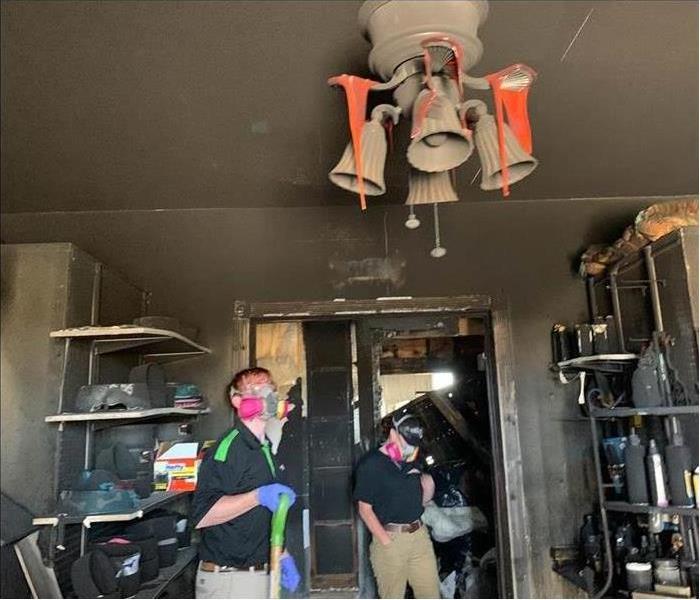Kitchen Hazards and What to Do
12/7/2022 (Permalink)
Kitchen Hazards and What to Do
Cooking is a wonderful pastime and can be a very relaxing way to destress. However, this is also when many kitchen accidents happen. There are so many hazards in the kitchen that you may not even realize they're there, but they can lead to serious injuries or even death if not addressed properly. Here are some major kitchen hazards that you need to know about:
Fire
When a fire breaks out in your kitchen, it's important to know what to do. If you're able to evacuate the building immediately, that's the safest course of action. If you can't leave, however, stay low and get under the table or other furniture closest to you. If there is a fire extinguisher nearby (and ideally one for each person who will be working in the kitchen), use it on small fires—but never on grease fires! Never use water on grease fires because this will only spread them further and make them harder to control—instead spray with baking soda or salt instead.
Gas Leaks
A gas leak can be deadly. If you smell gas coming from your oven, stove or other appliance, immediately leave the kitchen and call the fire department. The best way to check for a leak is to use a chemical-sensing device, like one of those that come with a new home's natural-gas hookup. If you don't have one of these, soap bubbles will suffice. Place a few drops on all parts of the appliance where gas might escape (don't forget about your dishwasher!), then light them with a match or lighter—if they don't pop right away and burn off without leaving residue, there's probably no leak here!
Knife Cuts
Knife cuts are one of the most common injuries to occur in the kitchen, so it's important to know how to avoid them and what to do if you get one.
Here are some ways to prevent knife cuts:
- Always keep knives sharp and clean
- Keep handles dry, clean, and free of grease or food particles
- Wash hands before handling your knives (and don't lick your fingers while chopping!)
Burns
You may think you know what a burn is, but did you know that there are several different types of burns? Burns can occur from hot liquids, steam and grease, open flames (like the stovetop or oven), hot pans, and sharp or pointed objects. Electrical burns are also common in the kitchen due to improper grounding or circuit breakers not tripping properly.
Burns are painful—and they can be serious if your wound isn’t treated properly. If someone gets a burn on their face and hands, it can be difficult to do everyday tasks because they need to use these areas so much. That’s why it’s important to seek medical attention after sustaining any type of burn injury!
Broken Glass and Sharp Objects
Broken glass and sharp objects are major kitchen hazards, as they can cause serious cuts. Broken glass is often found in the garbage disposal, so be sure to clean out your garbage disposal regularly with a plumber's snake (a long metal tool that can remove food particles from pipes).
Rat and Insects Infestations
Rat and insect infestations can easily happen in your kitchen, and you will want to prevent them as much as possible. First, ensure that food is stored in tightly sealed containers. This will prevent mice and other small rodents from getting into them. Second, keep garbage in a tightly sealed container as well. Rats and mice love stinky stuff like old food scraps or leftover pizza crusts—and they'll eat just about anything if they're hungry enough! If you notice that a rat has gotten into your place (such as when it runs across the floor), it's important to clean up any spills immediately so that the rat has no reason to stick around after eating its meal of leftovers. Finally, use traps to catch any rats or mice that manage to get inside your house despite all these precautions! With proper care for keeping pests away from your home—as well as for preventing an infestation when one does occur—you'll be able to enjoy being safe from harm while still enjoying delicious food prepared by yourself instead of someone else at home :)
When it comes to cooking, there are many hazards that can be avoided. And while you might not think about kitchen safety too often, it’s important to consider these risks and take steps to avoid them. In this post we have covered some of the most common hazards in kitchens—including fire, gas leaks, spoiled food, knife cuts and burns—and shared some tips on how to avoid them. We hope that by reading through these 11 kitchen hazards you will be able to make your next meal safe for everyone involved!
If you have a serious disaster in your Cibolo, TX home, give SERVPRO of Schertz Central, Cibolo, Seguin, Gonzales a call!

 24/7 Emergency Service
24/7 Emergency Service
